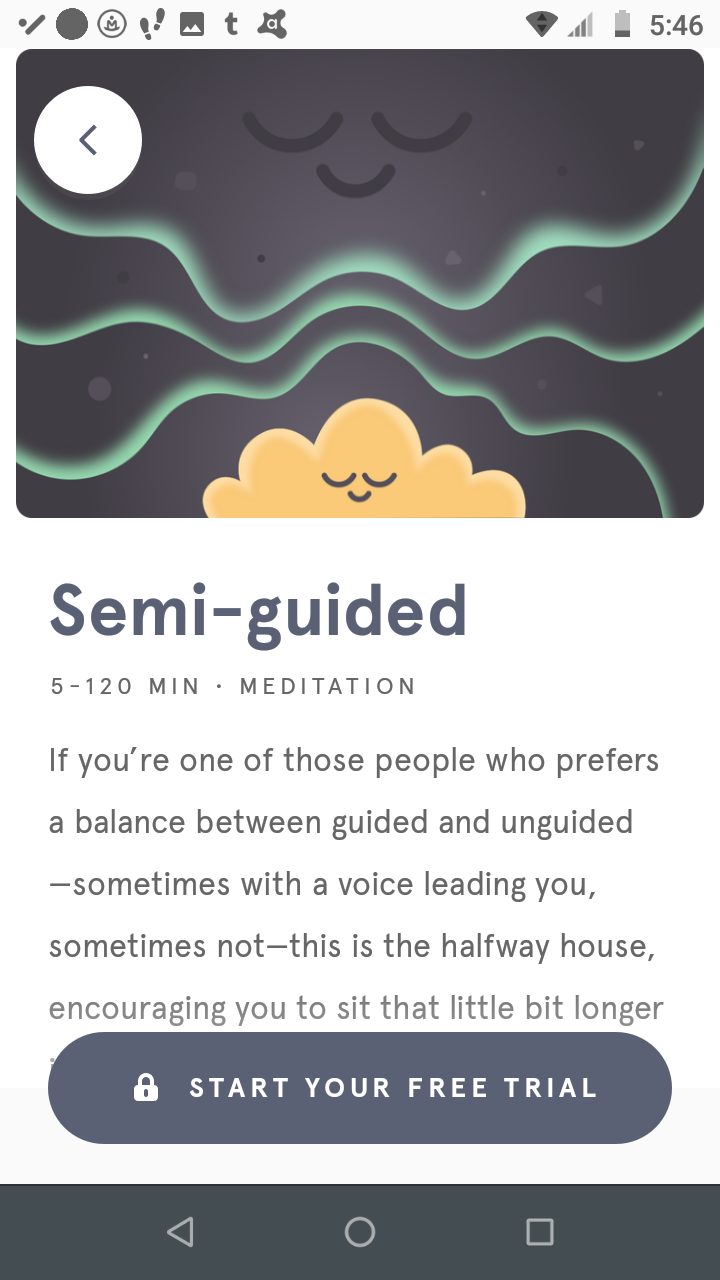A Tour of Mindfulness Apps
- Marie Jones
- Jan 22, 2022
- 11 min read
Headspace, Calm, Let’s Meditate, Insight Timer
Recently, using Marie’s text prompts, I began a meditation practice...the kind of robust, rock-you-to-your-core practice that lasts an average of five minutes a day. Though my initial dip into cultivating a practice was slight, it struck me early on how meditation was beginning to shape my response to the anxious tension I frequently experience in body and thought. Rather than defaulting to the muscle tension and constricted breathing I usually found myself caught up by, the practice of noticing sensations and paying attention to breathing rhythm seemed to break open the door to a new, deeper set point of bodily calm. I could access that calm with mindfulness techniques as needed, so that when stress approached, I had a greater chance of feeling grounded in my own body. That experience was powerful enough to solidify my interest in mindfulness practice.
I created this review of four meditation apps for beginners who, like me, are not the most consistent in nurturing a mindfulness habit, but are convinced of meditation’s potential benefit. All are available for Android from Google Play and for iOS in the App Store.
Headspace (Freemium)
Premium Subscription: $69.99/year; $12.99/month
Trial of premium service available.

Headspace was the app I used to get started with mindfulness, based on my therapist’s recommendation. The colorful, approachable program presents itself as a teaching tool for mindfulness beginners with a robust library for everyday meditation. Free trials of the premium service run two weeks with an annual subscription and one week if paying monthly.
Free Features
The Basics pack is the cornerstone of free offerings in Headspace. This beginner’s series includes a sequence of ten guided meditations, accompanied by brief animations that illustrate fundamental meditation concepts. Users have the option of meditating three, five, or ten minutes each session, and they can choose a female or male narrator to prompt them in noticing bodily sensations and thoughts (I overwhelmingly preferred the male voice). The animations focus less on immediate stress reduction and more on developing a curious, non-reactive attitude toward thoughts, sensations, and emotions. The sessions are led by sprightly animated characters who resemble an orange mutation of Muppets and circus peanuts. Offering guidance on topics like habit formation, body position, and dealing with distracting or unpleasant sensations, the little peanut people teach the user to access the self-regulating power of mindfulness strategies in their day-to-day life.
With its supportive teaching sessions and brief beginners’ meditations, the Basics pack is accessible with no prior mindfulness knowledge or experience. The free version of the app also logs the user’s minutes and days in a row spent meditating (a feature I found appallingly motivational). And you can repeat the Basics meditations and animations for more practice as many times as you wish.
Pssst... poking around in the sherbet-toned chinks and corners of the Headspace library, I found more resources you can access for free. Among the other free resources are sleep-specific music, soundscapes, and guided visualization. There are also brief wind-down, emergency, and early morning meditations. And there’s even an NBA-inspired Performance Mindset section, for people like me and you, who like to imagine we could one day be in the NBA. Finally, a series of animations offers advice on topics that affect mindfulness, like posture, doubt, motivation, and worry. The Basics pack is the most visible of the free offerings, but many other resources are available (look for items without a padlock).
Paid Features
A subscription unlocks additional options in the organized and well-stocked meditation library. The paid version of the app shares a new guided meditation each day. As daily practice options go, Headspace offers a Basics 2 and Basics 3 sequence with ten sessions each. Like the first Basics pack, individual meditations have alterable lengths (10-15 minutes for Basics 2 and 10, 15, or 20 for Basics 3). Following these series are six cumulative sequences of ten sessions each, called Pro-Level courses, and a yearlong daily course that progresses from basic to complex meditation concepts and features ten-minute sessions.
For more options in exploring awareness, Headspace has three meditation timers, offering guided, semi-guided, and unguided options, with sessions lasting anywhere between five minutes to two hours.
A subscription also opens collections of meditations on personal growth concepts like anxiety, being a student, relationships, grief, pain management, and even experiencing serious physical illness. I browsed the Relationships series, which featured 10-minute or 20-minute sessions and was divided into three sequential categories with ten sessions each (Learn, Practice, and Master).
The library includes specific standalone meditations related to activities like working out, eating, and doing housework, as well as a surprising number of focus music tracks (with each track offering three hours of pure musical focus).
Meditations for children ages 0-5, 6-8, and 9-12 also have a home in the library, as do resources about pregnancy and common parental hurdles like handling one’s temper and feeling overwhelmed.
Finally, wind-down and sleep resources abound, featuring not only music and sound tracks but guided visualizations ("sleepcasts"), which depict a journey through a calming and often whimsical locale. Consider, for instance, Cat Marina, an unbelievably appealing visualization where sleep seekers imagine interacting with cats who live on boats in the marina. A different cat lives on every boat.
Calm (Freemium)
Premium Subscription: $69.99/year
7-day trial of premium service available.
The next stop on our tour of apps is Calm. Let’s consider our meditation tour as exploring a property (say, Mindfulness Manor? I don’t like it. But I have a feeling it’s going to stick.). If Headspace represents the classroom, then Calm is the cool-down room.
Calm features a library of soundscapes, music, meditation, classes, and guided visualizations. The unpaid version offers a sampling from each of their feature categories rather than a central no-cost feature like the Basics pack in Headspace.
The app’s focus on immersive relaxation is immediately apparent from the animated nature scene and ambient sound that loop constantly in the background. Users can select other scenes with associated sounds to replace the default rippling lake option. I must admit my senses felt like crickets were assailing them, so I muted the nature-sounds option promptly (those similarly sensitive can select the Silent Earth animation for a blessedly silent experience).
The homepage features several tools for choosing meditations, a Mood Check-In tool, and Quick and Easy options (paid meditations between 90 seconds and 2 minutes). Each day, a new 10-minute meditation called Daily Calm appears on the homepage. Each Daily Calm addresses a different theme (for instance, the day before Valentine’s Day, when I took my notes, the theme was “Fear of Intimacy.” Hm.) The current Daily Calm meditation is available only to subscribers, but sessions are archived, with popular titles available for free.
In another testament to the app’s emphasis on relaxation, the first tab on the navigation bar is Sleep, rather than Meditate. For subscribers, Calm’s Sleep Stories library features a collection of guided visualizations narrated by notable voices. The complimentary library includes only one Sleep Story, a 24-minute guided exploration of Provence narrated by Stephen Fry.
The whimsical wind-down stories include riffs on classic fairy tales and imaginative travelogues (Take a sea voyage! See Australia by train!). Some are designed for children, and others feature voices beloved by... at least two generations, I'd say. Notable among these are Bob Ross, LeVar Burton, “Bueller’s Teacher” (is that what people call Ben Stein now?), and Lucy Liu.
The Meditate tab offers individual guided meditations and themed series across categories like stress, beginners, kids, emotions, focus, self-care, and sleep, as well as meditations for activities like commuting, eating, and walking. Series meditations include 10-15 minute sessions that address topics like depression, performance anxiety, and flight anxiety. Some of these also feature celebrity voices, like LeBron James’ series on mental fitness and performance mindset called “Train Your Mind.”
Non-subscribers can only access the first session of meditation series, with the exception of a complete four-part class called The Confidence Series. Timed and Open-Ended meditations include ambient sounds and nature imagery the user selects, and bells that mark the selected length of time (from one minute to 8 hours). Open-Ended meditations repeat the bell at selected intervals, and the soundscape plays until the user stops the app.
The music tab provides access to tracks across categories like focus, relax, lullabies, sleep, soundscapes, and nature melodies. Unpaid users have far fewer restrictions on accessing music than other types of content on the app. Between 30 and 60 minutes long, tracks feature such sonic stars as Lindsey Stirling, Moby, Sam Smith, and Sigur Rós.
I find nature sounds to be anxiety-throttling. So I found “Rain on Leaves: Extended Mix.” As I listened, I noticed that LeBron James curated this particular soundscape, which prompted me to wonder: did basketball star LeBron James really take his waterproof recording device out in the woods on a rainy day to curate a recording of JUST this water drop splashing against… yes, just that perfect little leaf over there? (For your information: no, he didn’t. The truth is a little more poignant than that.)

Calm Kids groups together sleep stories, meditations, lullabies, and soundscapes suitable for children. Only the music in this section is free without a subscription.
Available only by subscription, Masterclasses feature audio lectures addressing specific topics across multiple sessions. Masterclass topics include sleep, parenting, gratitude, sports, self-compassion, and breaking bad habits (an example that stood out for me addressed social media and screen addiction). Masterclasses have three to seven sessions each, with individual sessions running 10-20 minutes. Teachers include Dr. Jud Brewer (of habit-change fame), Tara Brach (of meditation fame), and Elizabeth Gilbert (of eating, praying, and loving fame).
Available to subscribers only, Calm Body offers eight short exercise videos with a focus on mindful movement for a variety of activity levels.
The final option in Calm's menus, the Breathing Exercise, is free to all users. In this exercise, a "breathe bubble" expands in time with the rhythm of breathing. The user can adjust how long to hold an inhale or an exhale, and the app signals each transition with a resonant “ding.” Sound-sensitive users like me may prefer to jettison the "ding."
Let’s Meditate (FREE)

If Headspace is the classroom in Mindfulness Manor, and Calm is the cool-down room, Let’s Meditate is the small art gallery in the hallway between them.
The app’s homepage features a list of around 40 meditations. Each entry indicates the meditation’s length and theme, as well as the gender of the narrator.
No advertisements. No social network. That’s the Let’s Meditate app. There’s a like button which influences the order in which meditations appear on the home menu. The app also keeps track of how long a user meditates, and lets users set two meditation reminders daily.
Rather than streaming through the app, users download meditations one at a time as they decide to use them. It’s extremely easy to delete the downloads inside the app.
The most notable quality of Let’s Meditate, for me, is that it’s a supremely lightweight application. Storage statistics on my device ascribed a total 11.42 MB to this program (compare that to Headspace’s 50 and Calm’s 200+). As someone whose phone is smart but has trouble with memory, this incredible lightness could be an unbearably appealing characteristic.
That is… if I liked the meditations. Browsing through the homepage, I observed few meditations that were shorter than 15 minutes. Some ranged toward 45 minutes in length. Even the Beginner’s Guide was a ten-minute session. Longer meditation times might render this collection less accessible to beginners than, say, Headspace’s Basics pack. Shorter sessions included a 2-minute “breathe and relax” meditation and two five-minute sessions, one on relaxation and one on sleep. The body scan session lasted 14 minutes, and various sleep stories and a depression meditation each lasted 15 minutes. Some guided sessions feature more frequent prompting than others.
One more note on content: themes sometimes encompass some esoteric emphases, like chakra activation and manifesting abundance. If you prefer a collection that’s more strictly scientific, you might not like some of the options in Let’s Meditate.
Insight Timer (Freemium)
$59.99 per year ($29.99 for the first year)
7-day trial of premium features
And, now, we arrive at our final stop on our tour of Mindfulness Manor: the grand library.
This astonishing announcement greets you front and center in this app: there are over 20,000 guided meditations here, all free to access. Indeed, the Meditation library features sessions on most any topic imaginable. There are meditations for beginners, parents, kids, athletes, students, and people trying to fall asleep. There are soundscapes, sleep stories, music tracks, and content from contributors to other apps (including Calm contributors Tara Brach, Dr. Jud Brewer, and Moby.).
It’s clear Insight Timer has no shortage of diverse, high-quality content. Given such a wealth of choices, a key strength is its organizational scheme. Meditations on Insight Timer are tagged for ease of navigation. These descriptor terms appear at the bottom of an individual meditation’s page (tags and other key words are also searchable in the search bar).
For instance, when I clicked on the Body Image descriptor attached to one meditation, a list of all meditations with the Body Image tag appeared. Within that results page, I could further limit my search by length, narrator gender, musical content, and many, many terms related to technique and tradition. Because of this diversity of search terms, some prior awareness of traditions and teachers is helpful to navigate Insight Timer’s library. A search can include or exclude tags like secular mindfulness, science-based, new age, Christian, and other terms related to a huge variety of faith traditions. Users also have the option to hide content marked as Spiritual or Religious.
The other powerfully customizable feature of this app is Timer. This meditation timer offers adjustable session lengths (up to 24 hours!) with bells at chosen intervals. Users create a sensory environment through selecting ambient sound, background images, and varied bell sounds inspired by Tibetan Singing Bowls. Insight Timer allows users to customize all three sense elements and to save presets with favorite combinations. While I did not care for most of the ambient sound options, I found the choices of interval bell and their sound quality impressive.
Paid Features
The premium option provides access to Insight Courses, Daily Insights, and advanced audio options.
One of the central subscription features is unlimited access to over 200 Insight Courses, multi-part teaching and meditation sessions led by recognized teachers on a variety of personal growth topics. I browsed through courses on meditation and poetry, climate change anxiety, yoga, and social anxiety. At one point, I paused to drool over a kids’ course that included nature and art meditations.
Daily Insights offer a new guided meditation of customizable length (between five and 25 minutes) every day, and an archive of selected sessions. Paid users can download meditation tracks for offline use.
High Quality audio is a paid feature, as are fast-forward, rewind, and the “pick up where you left off” feature.
An issue that gave me slight pause was the privacy discomfort I felt at the default settings on the social feed. The Insight Timer homepage features a real-time feed of users meditating and what recording they’re using. In fact, according to the feed, 5.3 thousand people are meditating with the app as I write this. If I specified my location, the feed would reflect what users in my area are doing. This felt a little invasive, and it seems unnecessary to have my meditation activity shared with the world... stranger yet to have it shared with my neighbors. For those who share my discomfort, you can edit your privacy settings so only friends can see your activity.
The Verdict
Headspace is a powerful teaching tool, friendly, suitable for beginners, and with a thorough enough library to keep habitual meditators satisfied.
Calm is a place you might want to hang out if you’re looking for immersive sensory content that emphasizes sleep, focus, and relaxation (and you’re willing to pay for meditations and educational content).
Let’s Meditate is a good free option for those with low-memory devices and/or for more experienced practitioners who are open to curating personalized meditation playlists.
Insight Timer features a large, diverse meditation library, entirely free to access, with courses and advanced audio options available with subscription.
For my own eclectic and sporadic practice, I’m inclined toward Insight Timer. I like how it offers a variety of techniques, traditions, session durations, and intensities of focus to explore. If I decide to initiate a more intentional daily practice, though, I’m drawn to try Headspace. The continuity in its learning sequences, the thoroughness and thoughtfulness of topics in the library, and the whimsy of its more imaginative offerings all resonate with what I’m looking for.
(I’m looking at you, Cat Marina.)
Disclosure: Neither Marie nor I received compensation to promote these platforms. Nor were we bribed by any associates of the apps to trash their awareness colleagues. Do you really think a circus peanut Muppet cat would put us up to that?
Z. Morrow is a cat bribery specialist living in the left-hand part of North Carolina.



























